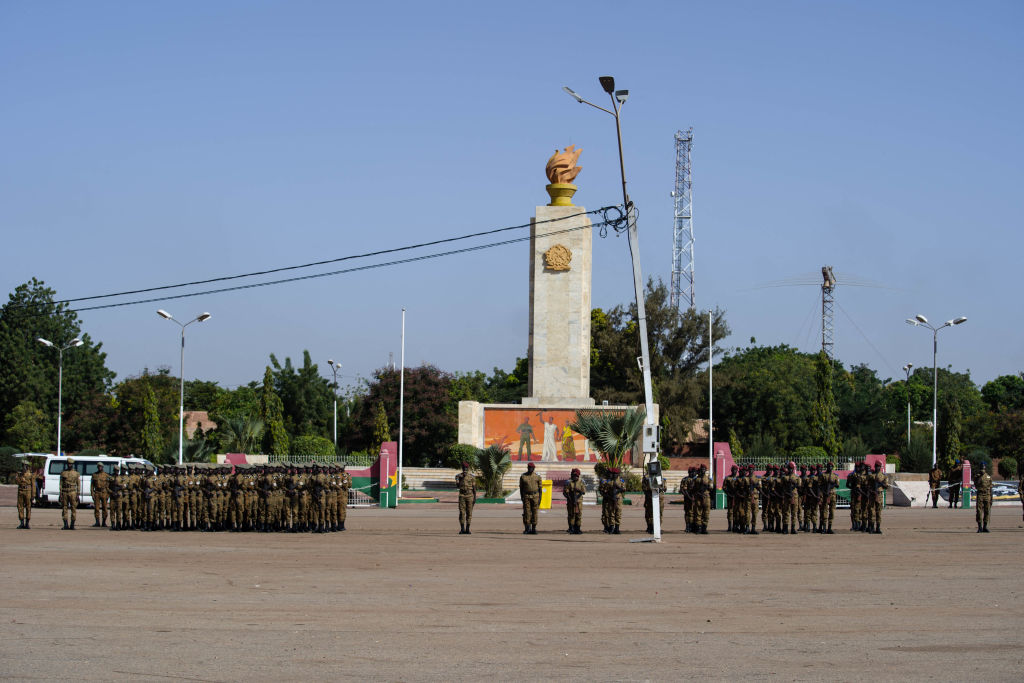ADF STAFF
As it seeks to expand its presence in the Sahel region, Russia appears to be following the same playbook in Burkina Faso that it used to embed itself into Mali’s security apparatus.
Despite recent denials, Burkina Faso has courted Russian support, possibly including Wagner Group mercenaries.
Burkinabe Prime Minister Apollinaire Kyelem de Tambela indicated as much after January talks with Russia’s ambassador. He also visited Moscow for several days in December to discuss cooperation between the two countries.
Multiple reports indicate a Wagner deployment is likely.
A European diplomatic source told Reuters that the European Union has knowledge of contacts between Burkina Faso and Wagner, but the source could not confirm whether an agreement had been reached.
In December, Ghanaian President Nana Akufo-Addo said Burkina Faso’s military government already had agreed to terms with the Wagner Group.
“I believe a mine in southern Burkina has been allocated to them as a form of payment for their services,” he said in a news conference.
The allegation caused a diplomatic row and Akufo-Addo’s government later “clarified” the statement during talks. But Russia has at least one mining operation in Burkina Faso, and its Wagner Group subsidiaries have a pattern of extracting natural resources from countries as a source of payment.
Wagner mercenaries bring significant risks to any country.
The group has been accused of committing atrocities against civilians and pillaging mineral wealth, which has resulted in further deterioration of the security landscape.
In Mali, Wagner fighters have been linked to civilian massacres, including the summary executions of some 300 people in a central Mali village in March 2022.
In the Central African Republic, the Russian mercenaries have been accused of killing, raping and torturing civilians while looting gold and diamonds.
Part of the Wagner playbook is to create the appearance of local support with fake grassroots movements led by paid influencers who typically hand out Russian flags.
For civilians, there is no security offered by the mercenaries who are unaccountable for their actions. For terrorist groups, the presence of unprofessional and ineffective Wagner fighters has resulted in increased recruitment of angry locals affected by the Russians’ handiwork.
Holding Wagner accountable is extremely difficult, according to Dr. Sorcha MacLeod, chair of the United Nations Working Group on the Use of Mercenaries.
“When you’ve got these mercenary proxies there, then the state can be involved in an armed conflict without being an official party to the conflict,” she told the BBC. “And then you’ve got plausible deniability … and of course that has huge implications when it comes to responsibility and accountability.”
Mutaru Mumuni Muqthar, executive director of the West Africa Center for Counter-Extremism, said concerns about the Wagner Group are valid because of the mercenaries’ track record of failing to effectively thwart or even slow extremist violence.
“We don’t think that these Wagner forces have that sense of legitimacy in terms of building structures that are sustainable to deal with the threats,” he told Voice of America.
“We have not had any good example anywhere, and so we are very worried that it will be used for other objectives and aims, especially when it comes to regime change.”
The spread of Russian influence and the rash of coups in the Sahel have only brought further misery to the region.
Burkina Faso, Mali and Niger saw a 50% increase in deaths due to conflict, according to 2022 statistics from the Armed Conflict Location and Event Data Project.
Experts warn that Russian mercenaries have proven not to improve security.
“When these kinds of actors are inserted into armed conflicts, the conflict is prolonged and there is a greater risk of war crimes,” MacLeod said.
“The reality is these organizations have no incentive in bringing a conflict to an end. They are financially motivated.”

